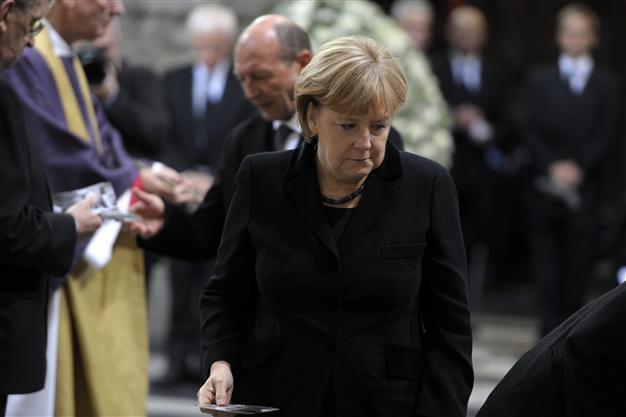Germany's SPD lists demands for entering coalition with Merkel
BERLIN - Reuters

German Chancellor Angela Merkel. AFP photo
Leaders of Germany's Social Democrats (SPD) have told party members they will wring concessions from Angela Merkel if they start coalition talks, including on a minimum wage, equal pay and a financial transaction tax.According to an internal document seen by Reuters on Sunday, the SPD will say 10 demands are non-negotiable, including a minimum wage of 8.50 euros per hour, equal pay for men and women, greater investment in infrastructure and education, and a common strategy to boost euro zone growth and employment.
The document was prepared by SPD leaders for a meeting on Sunday at which about 200 senior members from across Germany will vote on whether to start talks on forming a government with Merkel's conservatives.
The party will also demand equal pensions for seniors in the former West and East Germany, the ability to have dual citizenship, and measures to make it easier to combine work with family life.
No mention is made in the document of tax increases for the wealthiest, which the SPD had campaigned on during September's election but which the chancellor has ruled out.
Merkel's conservative bloc - her Christian Democratic Union (CDU) and its Bavarian sister party, the Christian Social Union (CSU) - emerged as the strongest political force in the Sept. 22 election but fell several seats short of a parliamentary majority, forcing them to seek a coalition ally.
The SPD, which came a distant second to Merkel, was seen as the most likely partner from the start, but the party is keen to avoid a rerun of its 2005-2009 'grand coalition' with Merkel. It emerged from that with its worst election result since World War Two, making many members sceptical about another union.
"This time I can guarantee that we will not strike a coalition agreement in which we do the opposite of what we pledged in the election," SPD Chairman Sigmar Gabriel told German newspaper Bild on Saturday.
New election
Erwin Sellering, the SPD state premier of Mecklenburg-Vorpommern, said in an interview in Welt am Sonntag newspaper on Sunday that Merkel should not think her poll lead allowed her to call all the shots.
"If we are not able to push through enough of what we have pledged, then we must say to voters: 'sorry but we are not available'... fresh elections are nothing alarming for us."
A draft of the declaration Gabriel will ask SPD leaders to sign on Sunday says the party "agrees to enter formal coalition talks with the intention of forming a government."
If Gabriel secures party backing, as expected, talks on coalition policies and cabinet posts would begin on Wednesday. They could last more than a month.
German voters, international investors and Berlin's European allies have mostly been expecting a grand coalition and few expect any partnership deal to greatly alter Merkel's domestic and foreign policy agenda.
The chancellor's talks with the environmentalist Greens broke down last week, strengthening the SPD's hand.
Such a partnership would enjoy an overwhelming majority in the Bundestag, the lower house of parliament, and find it easier to push legislation through the Bundesrat, the upper house where the governments of Germany's 16 federal states are represented.
The SPD will seek final approval of any coalition deal in a poll of its members.
















